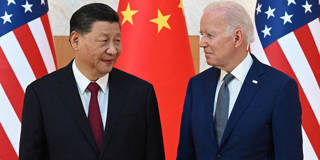JAVIER SOLANA and EUGENIO BREGOLAT

MADRID – China is currently experiencing a particularly turbulent period in its history. Late last month, weeks after the Communist Party of China’s (CPC) 20th Congress reaffirmed President Xi Jinping’s leadership, unprecedented protests against Xi’s zero-COVID policy erupted in the country’s major cities.
Xi’s decision to abandon the zero-COVID policy marks a radical shift in China’s pandemic-containment strategy. The CPC responded by swiftly lifting China’s severe pandemic restrictions. While official statistics do not always offer an entirely reliable picture of what is happening in China, few question the fact that a period of serious complications lies ahead regarding the containment of the virus in China.
Chinese domestic politics will likely dominate news headlines over the next few months. But China’s deferred reckoning with the pandemic must not overshadow the urgent task of preventing a direct confrontation with the United States. November’s G20 meeting in Bali – where Hindu, Buddhist, Confucian, Taoist, and Christian cultures coexist peacefully – offered an ideal setting for the meeting between Xi and US President Joe Biden.
Fortunately, the summit concluded on a positive note. Both Biden and Xi expressed willingness to redirect the bilateral relationship and reopen diplomatic channels to discuss, among other things, the fight against climate change. Biden, for his part, sought to assure the world that the US is not seeking a new Cold War that would “contain” China by organizing alliances against it or stifle its economic development, and that it will maintain the “one China” policy.
Xi, unsurprisingly, reiterated China’s familiar positions on a number of issues. For its part, China does not want to impose its political system outside its own borders. That is, China does not see the Sino-American relationship as a clash of ideologies and called for an end to the economic and technological conflict that is now underway.
While some segments of American politics want to decouple from China’s economy, most US allies do not share this sentiment. During his recent visit to Beijing, German Chancellor Olaf Scholz made it clear that although he sees many risks in being excessively dependent on China, Germany does not support severing economic ties. Other US allies, including the rest of the European Union, Japan, and South Korea, are similarly protective of their economic and technological relationships with China, especially at a time of financial distress.
Semiconductors have been referred to as the “oil” of the twenty-first century. In October, the Biden administration decided to restrict China’s access to certain chip-manufacturing technologies, a measure that will significantly affect the Chinese economy and place both powers on a collision course.
These measures have also stoked old fears. Having arrived late to the Industrial Revolution, China lost the nineteenth-century Opium Wars to Great Britain and suffered what is now known as the Century of Humiliation. But the Chinese have learned their lesson and now aspire to be at the technological forefront. Given the importance of technological development as a basic pillar of a country’s military might, it is no surprise that China considers chip manufacturing a national-security imperative.
For China, being relegated to the status of second-class technological power is equivalent to being exposed to subjugation by countries with superior military capabilities. Although the US-China chip war is arguably just part of a natural strategic competition between superpowers, the Chinese view is closer to that of the Financial Times’ Martin Wolf, who recently called the American semiconductor restrictions “an act of economic warfare.”
Without China’s opening up to world markets, a transition in which the US played a prominent role, the Chinese economy’s rapid growth over the past 40 years would not have been possible. China’s 2001 accession to the World Trade Organization even helped to heal some of the wounds caused by the Century of Humiliation. Any additional US-led attempt to contain China’s economic rise risks stoking even higher levels of nationalist resentment.
In a world increasingly defined by geopolitical rivalry between the US and China, the EU is demanding greater strategic autonomy, which has significant geopolitical implications. One of the EU’s main tasks over the next few years will be to define its position on China more clearly, without compromising its role as a mediator between China and the US.
Addressing humanity’s most pressing problems – particularly global crises such as climate change, economic recovery, COVID-19, and the proliferation of weapons of mass destruction – requires multilateral cooperation. But the international community cannot solve any of them without a modicum of strategic trust between the world’s two great powers. The Biden-Xi meeting in Indonesia signaled that not all hope is lost. When it comes to figuring out how to meet the challenges of the twenty-first century, Bali has shown us the way.
No comments:
Post a Comment